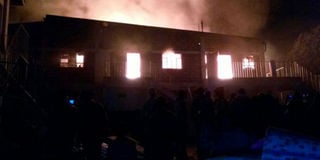Bosire and Muthuri: We are partly to blame for school unrest

A dormitory goes up in flames at St Angelic Girls Secondary School in Meru on July17, 2016.
What you need to know:
- We have refused to address the issue of bullying in schools yet research has shown that 60-80 per cent of our children suffer some forms of bullying.
- We cannot expect our children to uphold virtues like mercy, integrity, patience and kindness while all they see at home is the opposite.
- The blame fairly lies with the sad nature of our society.
- A society which instead of listening to the pleas of our children forces them to man-up, face their fears alone.
Most of Kenya's early memories of public primary school can be summed up with one word: Violence. It is ironic that as a society we are quick to point fingers at truant children, we are also to blame for normalising violence within households, communities and our learning institutions.
We are silent when caregivers physically, sexually, psychologically abuse children; some of the outcomes of these violence are seen in studies such as teenage pregnancy.
As adult caregivers, we are also at fault of emotional violence through denigrated treatment, intimidation, rejection, discrimination, and our acts of hostility towards our children.
The problem of violence among children is so pervasive that the Ministry of Labour and social protection launched a multi year survey,’ the National Prevention and Response Plan on Violence against Children 2019- 2023.
The plan takes a holistic approach to addressing violence against children focusing on; family support, education and life skills, community norms and values, response and support services, laws and policies as well as meaningful coordination.
On 8th November 2021, Prof Magoha is quoted saying:
“I used to be a prefect before and the only difference at my time is I used to be caned. If I was not caned 6 strokes of the best (sic), you wouldn’t see Magoha here as a Cabinet Secretary for Education.”
Childhood violence clearly is not the solution otherwise as a country we would not have included this provision in Article 53(1) (d) that recognises the right of all children to be protected against abuse, harmful practices, all forms of violence, inhumane treatment and punishment, and hazardous or exploitative labour.
A collective problem
So how have we contributed to the violence we are witnessing in schools? Because this is a collective problem..
We have refused to address the issue of bullying in schools yet research has shown that 60-80per cent of our children suffer some forms of bullying with Kenya’s bullying rate higher than the world’s. Teasing, threatening, hitting, stealing and taunting are some of the ways children are bullied.
When a child comes home with less of their belongings, what do we do?
Often, we enable the bully's behavior by replacing the stolen belongings with new ones only for the cycle to continue until such a time that the child can stand up for themselves and fight back, mostly senior high school and privacy level- essentially giving rise to more bullies.
By enabling these behaviour, we refuse to deal with institutionalised bullying hence not holding schools, their principles and even the Ministry of Education accountable.
Intimate partner violence- domestic violence in our homes has been shown to have a correlation with violent children.
Children that witness violence are at a high risk of developing mental health issues- anxiety, insomnia, depression, poor eating habits, self-harm and self esteem issues.
These children often than not also end up being violent- the repetitive cycle of abuse.
We cannot expect our children to uphold virtues like mercy, integrity, patience and kindness while all they see at home is the opposite.
The sad reality is that parents are usually the first role models, and from a young age, children grow up imitating what they see at home.
Where did we go wrong?
Agreeably we have all seen the trending news in Kenya about the increase in arson cases in our schools.
It has become a norm to hear of yet another school being set ablaze by aggravated students. A report by Voice of Africa’s Yusuf indicates that over thirty schools have been closed down after arson incidents throughout the country.
The violent outbursts of students are mainly aggravated by the current unstable curriculum, the Covid-19 pandemic, the overwhelming workload and stress.
However, there is indeed a deeper underlying reason for these behaviours. Why is it that the current students are not open to discuss matters affecting their lives? Is violence and arson the only resort to their predicaments?
Without a doubt, there are a multitude of other solutions that would suffice to settle the anxieties, stress and weariness.
But the sad reality is that the country is so much fueled by violent and harsh incidents that students don’t see more amicable conflict resolution means.
Where did we go wrong? The blame fairly lies with the sad nature of our society.
A society which instead of listening to the pleas of our children forces them to man-up, face their fears alone, a society which condones the aberrant behaviours of the young generation, a society rife with so much violence and barbarism that even the most popular music has to be vile.
The Swahili proverb ‘mwacha mila ni mtumwa’ is undoubtedly vivid in our society.
The African peaceful methods of solving disputes and raising children are obviously long gone.
Lest we forget, the best method of solving a dispute in a civilised society is through dialogue.






